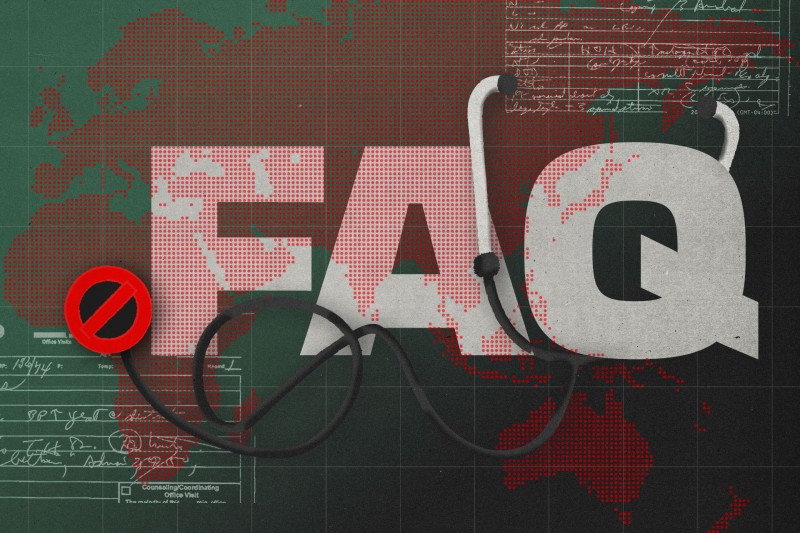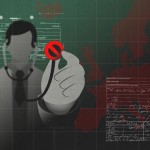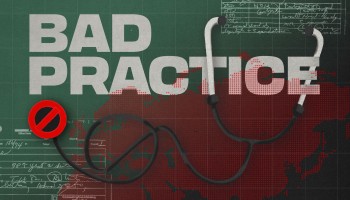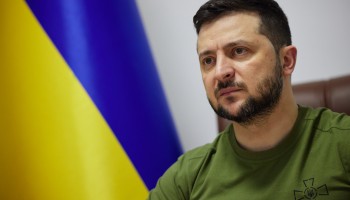What is 'Bad Practice'?
"Bad Practice" is a joint investigation by OCCRP and partner organizations in 45 countries. It reveals that doctors who have lost their medical licenses due to major wrongdoing — including sexual assault, botched medical treatments, and inserting breast implants without consent — can easily relocate and practice in different countries.
After being banned in one country, some doctors relocated to a jurisdiction where they already had a license, while others managed to obtain new licenses — sometimes by moving from one continent to another.
By calling their new workplaces, making online appointments, or visiting their practices in person, reporters confirmed that the majority of those doctors were not only still licensed, but still actively practicing medicine.
In most cases reporters did not find allegations had been brought against banned doctors after they relocated. However, erratic information-sharing across borders and a lack of public information on doctors’ disciplinary history leaves patients uninformed and potentially vulnerable. Even when a country’s medical regulator was informed about a doctor’s ban, this didn’t necessarily affect the doctor’s ability to practice elsewhere.
How many doctors did you investigate? Where are they working now?
Reporters found more than 100 cases in which doctors are licensed to practice in one country, despite being currently banned or suspended from practicing medicine in one or more other jurisdictions.
OCCRP’s investigation focused on doctors working in Europe, but the problem extended across continents. Some shocking cases included:
A psychiatrist once jailed in the United States for selling prescription drugs to vulnerable patients without medical reasons — now holding a medical license and running a psychiatry practice in North Macedonia.
A Romanian doctor banned from practicing in the U.K. after a tribunal ruled that he systematically subjected young men and boys to “unnecessary, invasive and intimate procedures for his own sexual gratification” — now working at a hospital in Romania.
A German practitioner given a lifetime ban in Switzerland for sexually assaulting an 18-year-old female patient — now working in a private medical center in Germany.
But these findings are the tip of the iceberg. The true scope of the problem is hidden by a lack of complete and comparable data.
How did reporters uncover all this? Where does the information come from?
Journalists spent months digging through public records and requesting information from national authorities about licensed and banned doctors.
They started by seeking lists of licensed doctors in 49 countries in and around Europe. However, information about medical licenses was difficult to obtain, as some licensing authorities have poorly accessible public registries — or no registries at all.
The reporters then searched for lists of doctors whose licenses had been suspended or revoked — but this information was even more difficult to find. Of the countries investigated, just seven publish data on inactive, banned, or suspended doctors. Reporters filed dozens of freedom of information requests to gain more information, but only nine were successful. Many requests were rejected for privacy reasons.
OCCRP’s research and data team built a database of more than 2.5 million records sourced from public registries, information requests, court records, local media reports, and confidential sources. From here, reporters could see when doctors banned or suspended in one country appeared to be licensed and working in another country.
The final step was old-fashioned reporting. In order to confirm whether these banned doctors were active in other countries, journalists called their new workplaces, made online appointments, or visited their practices in person.
OCCRP also asked the European Commission — the executive branch of the EU — for copies of all alerts and email notifications that had been sent out about restrictions and prohibitions on doctors between 2016 and July 2025. The list of 17,000 results was anonymized, but it did include dates of restrictions and prohibitions, which reporters were able to use to find likely matches and file freedom of information requests.
How can I check whether my own doctor has a history of malpractice or abuse?
It depends on where you live.
Of the countries that OCCRP and partners investigated, only the U.K. published detailed reasons for disciplinary actions against doctors. Ireland and the Netherlands published partial reasons in some cases.
In other countries, reporters had to use Freedom of Information requests in an attempt to obtain this data. Authorities in Sweden and Norway did provide full medical board decisions in response to individual freedom of information requests.
But many other authorities rejected these requests for privacy reasons.
For example, Slovenia’s national Medical Chamber refused to disclose the reasons for the five suspensions it had handed doctors in the past 20 years. When reporters tried to use Freedom of Information requests to obtain copies of the decisions, the Medical Chamber provided the documents with heavy redactions concealing the reasons for the doctors’ suspensions.
Even though Slovenia’s national freedom of information authority ruled that reporters should be granted access to the full decisions in the public interest, the Medical Chamber countered with a lawsuit, which is still ongoing.
Why were doctors able to keep practicing after they were banned? Why do some health authorities ignore warnings about abusive or incompetent doctors who move across borders?
Although doctors’ professional qualifications are automatically recognized if they move within the EU and European Economic Area (EEA), they must still apply to authorities in the country where they want to work, in order to obtain a license to practice.
It’s mandatory for countries in the EU and EEA to send alerts about doctors whose professional activities have been restricted or prohibited, even temporarily, by national authorities or the courts. This is done via the European Commission’s Internal Market Information (IMI) system, which automatically notifies medical authorities in EU and EEA countries when an alert is sent.
But reporters found that the alert system was barely or never used by some countries in relation to disciplinary action against doctors. Greece, Estonia, Malta, and Lichtenstein sent no IMI alerts about any doctor between 2016 and 2025. Ten countries filed fewer than 10 alerts during this period.
Member states are not legally obliged to consult the IMI system before approving a doctor’s qualifications, and have differing standards when it comes to revoking their licenses.
Even in cases in which an alert had been sent about a ban on a doctor in one country, it did not necessarily lead to action being taken by the doctor’s current jurisdiction in order to prevent them working.
For example, the U.K.’s General Medical Council said they had notified the Romanian medical regulator in March 2024 that Dr Iuliu Stan had been removed from the U.K. register after a tribunal found he had systematically subjected young men and boys to “unnecessary, invasive and intimate procedures for his own sexual gratification.” But Romania’s College of Physicians, which approves doctors’ licenses nationally, said that neither it nor the local branch in the city where Stan works were in a legal position to ban a doctor based on a decision made in the U.K., and that there had been no disciplinary, civil or criminal proceedings in Romania that would justify it.
Stan continues to practice in Romania.
How have national and European authorities responded to ‘Bad Practice’ ?
When OCCRP asked the European Commission about the lack of IMI alerts issued by some EU and EEA countries, it said that it was “monitoring the situation concerning the fulfillment of the obligation by member states to send alerts via IMI.”
It indicated that it may start infringement procedures if there is evidence that states are not fulfilling their obligations. It confirmed that infringement proceedings are currently in place against Greece.
“The IMI alert system only has a supportive role for member states, which are responsible for identifying the cases on their territory where doctors are unfit to pursue their profession and to apply relevant measures (such as prohibition or restriction),” the Commission said.
Regulatory authorities in the U.K, Germany, Cyprus, Spain, and Norway have confirmed they are investigating individual doctors practicing in their jurisdictions after receiving questions from reporters.
Britain’s health secretary Wes Streeting told OCCRP’s U.K. partner The Times that he had ordered “urgent clarification” from the country’s General Medical Council about its vetting processes for international doctors, after The Times identified 22 doctors in the U.K. who have been subject to discipline or restrictions overseas with no record of it showing on their licenses.
Has anyone raised concerns about this topic before?
OCCRP and partners’ investigation may be unprecedented, but EU lawmakers have been raising questions about the effectiveness of the IMI alert system in general and countries’ use of it since 2009.
An internal European Commission memo from 2020 said that member states had been slow to start using the alert system, and had experienced difficulties including an inability to filter the most relevant alerts from the high volume they received.
Last year, a report by the European Court of Auditors — the EU’s top watchdog body — on the use of the IMI system found that national authorities were “overwhelmed by alerts.” Authorities did not check alerts when reviewing applications for recognition of professional qualifications, nor was it mandatory for them to do so, auditors found.
The report also pointed out that member centers were obliged to send out IMI alerts indicating “substantial reasons” for a warning, but that there was no formal definition of this.
Stef Blok, a former Dutch economics minister who oversaw the report, told OCCRP’s Dutch partner Investico that the likelihood of mistakes or accidents is higher “because of the low use in a number of countries.”
In a written response to the report, the European Commission agreed to provide more context to help member states to distinguish cases that needed following up, including clarifying the concept of "substantial reasons” in 2025. It also agreed to provide guidance and “facilitate the exchange of best practice on the follow up of alerts,” but noted that the legal consequences of the alerts are up to member states.
The Commission told OCCRP that it was still working on a guidance document before the end of the year, as well as improving on the “user friendliness” of IMI alerts.
What have experts said about this?
Sjur Lehmann, a doctor who is now head of Norway’s board of health supervision, said that when healthcare workers are able to move countries freely, the need for authorities to cooperate increases.
“If a doctor loses their license for abuse or for otherwise putting patients at risk, then they will be just as dangerous in another country. So if we do not have a system in place for following up and cooperating in such situations, then in the worst case scenario, new patients will continue to be exposed to the same,” he told OCCRP’s Norwegian partner VG.
“The system we have today is better than no system at all, but there are clearly sides to it that can — and should — be further developed and improved.”
Tom Goffin, professor of healthcare law at Ghent University in Belgium, said the IMI warning system made little difference in practice because it wasn't primarily established to prevent malpractice in healthcare and healthcare providers are only a small part of it. The system is based on the principle of free movement of goods, services, and people within the EU, he said.
"The reports about healthcare providers who are in breach don't amount to much either,” he added. “Member States are asked to report their identity and the duration of their sanction. But more details aren't required. In most cases, we have no idea what someone did wrong or why they are no longer allowed to practice their profession," Goffin said.
The British charity for patient safety and justice Action Against Medical Accidents said regulators and employers must have “foolproof systems” for detecting doctors crossing borders to avoid bans or restrictions.
“Public trust in the regulation of medical staff is vital and it is deeply worrying that some doctors are managing to move country and continue to treat patients,” the charity’s chief executive Paul Whiteing said.
What have the doctors’ victims said?
Two lawyers representing victims of Romanian doctor Iuliu Stan — who continues to practice in his home country despite being banned in the U.K. — have called for stronger cross-border collaboration to safeguard the public.
Solicitor Gary Walker of U.K. firm Enable Law said there should be an “urgent review” of international systems through which medical regulators share information on disciplinary action and criminal convictions.
Tom Fletcher, a partner at law firm Irwin Mitchell, said that if a doctor had been struck off in one jurisdiction for sexual abuse, they should not be able to work as a doctor in another country.
One of Stan’s victims told OCCRP that it was “abhorrent ” that the banned doctor could practice in Romania.
“The fact that someone who has negatively impacted so many lives with their behavior when they were in a position of care over those people, and myself being one of them, has then been allowed to keep practising and potentially harm more people is abhorrent,” he said.
“It makes it feel like the people in charge don't care and that they think nothing of the people that have already been his victims."





